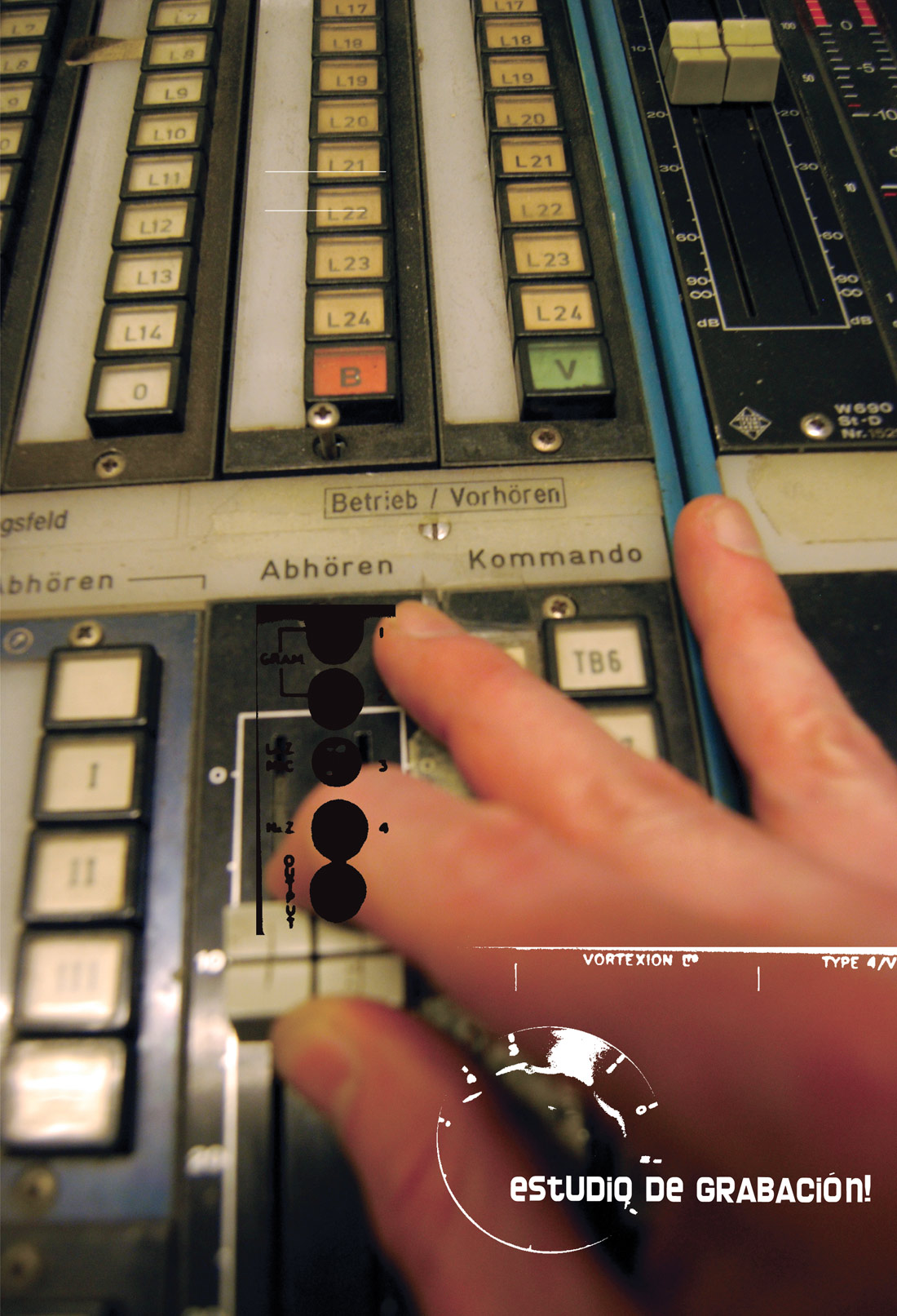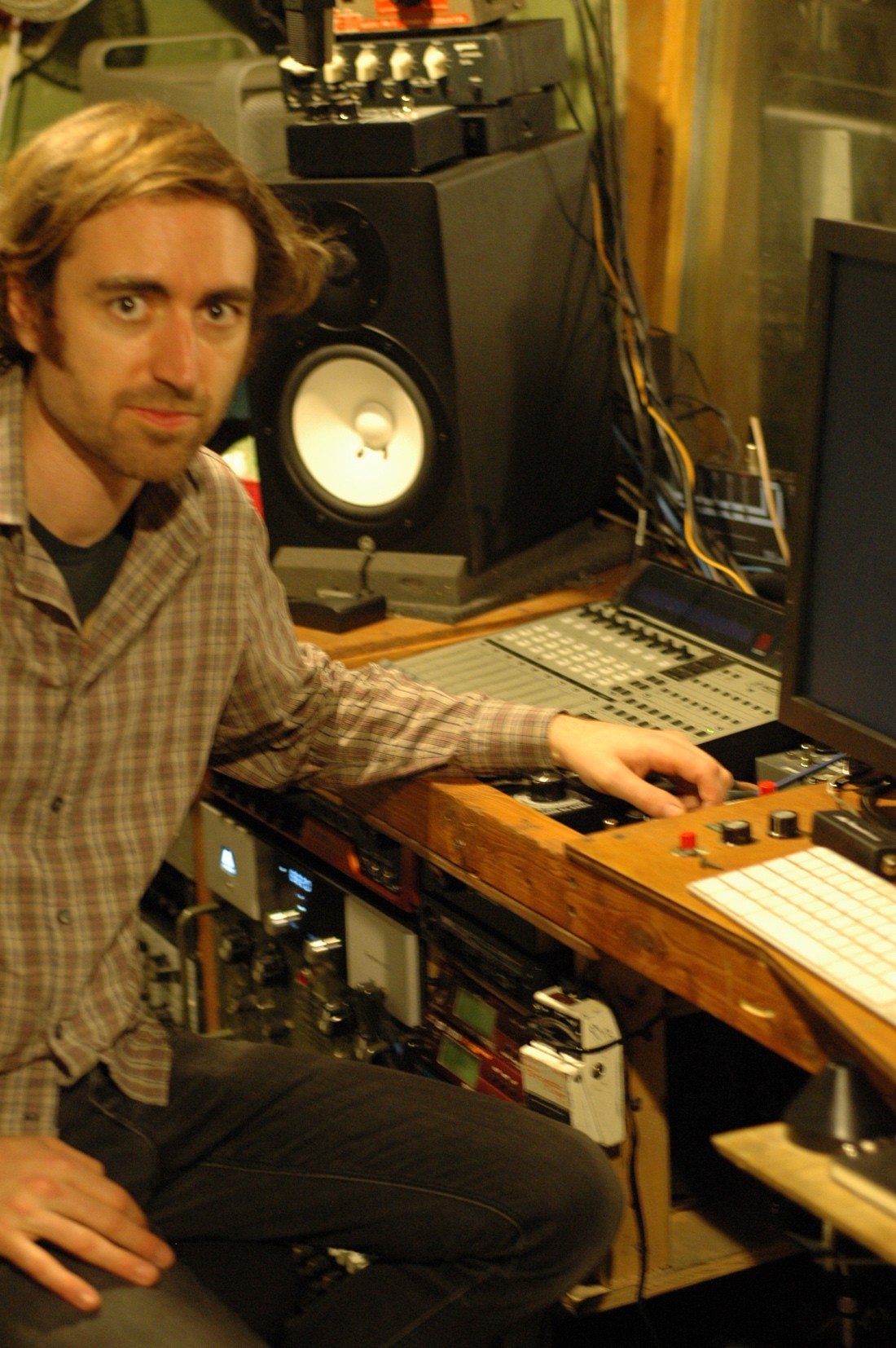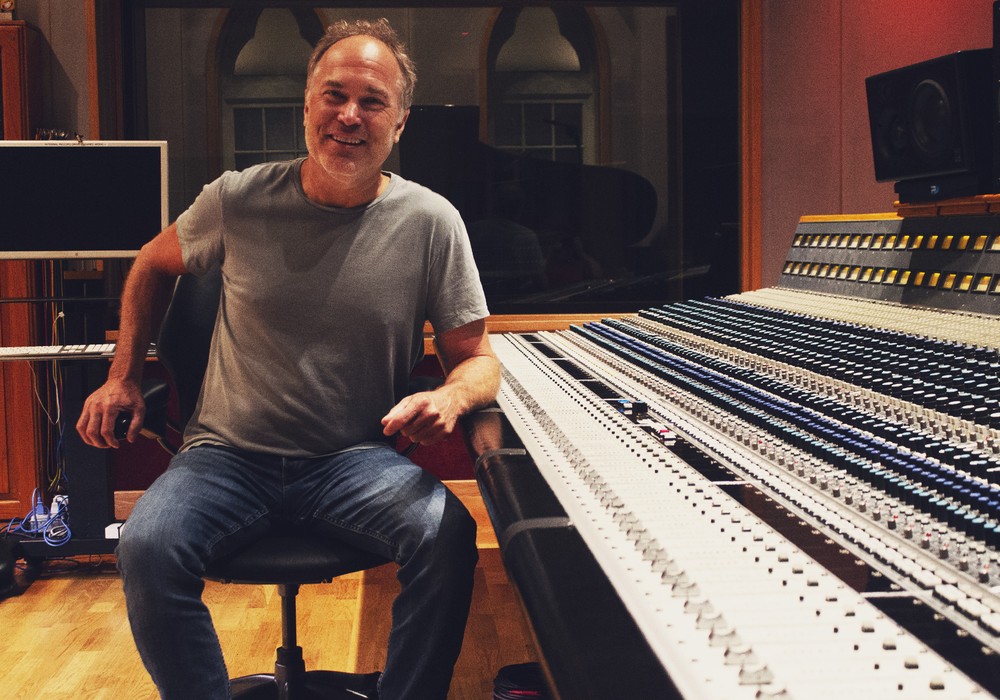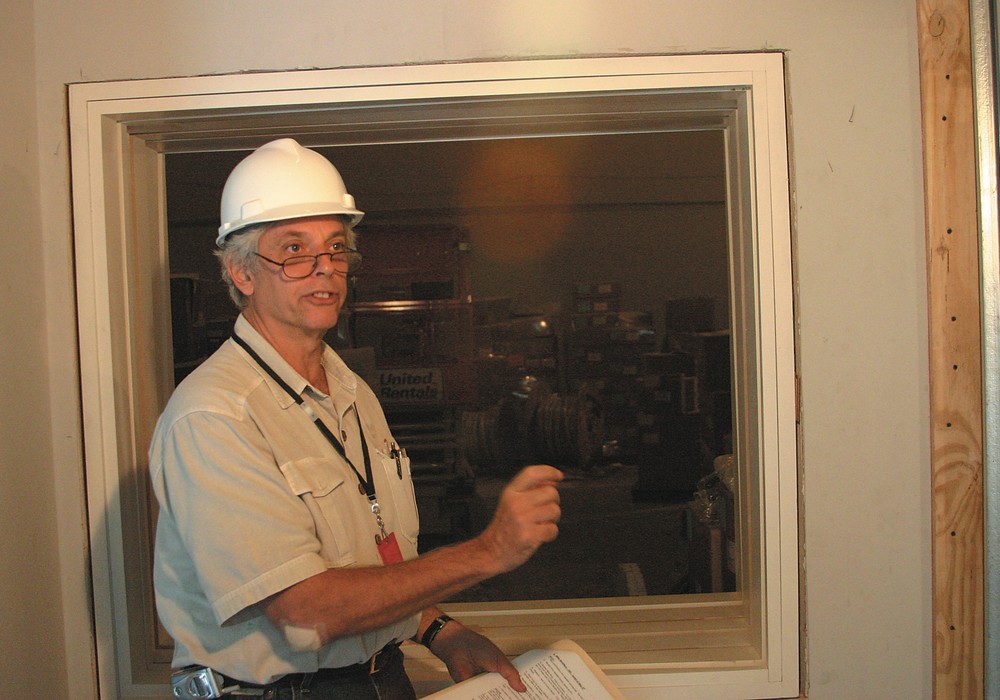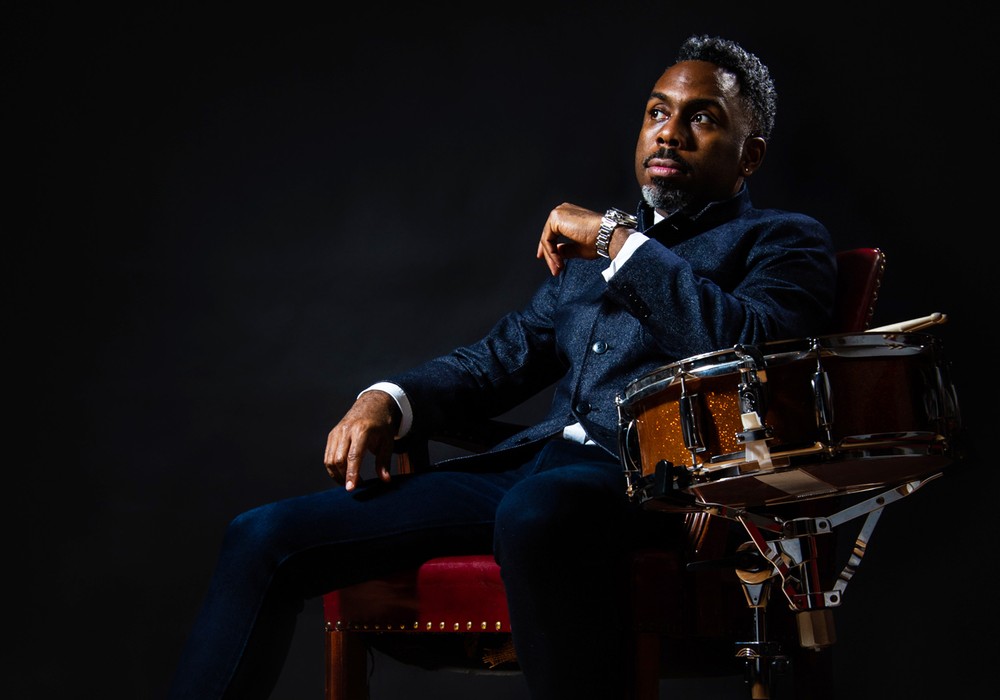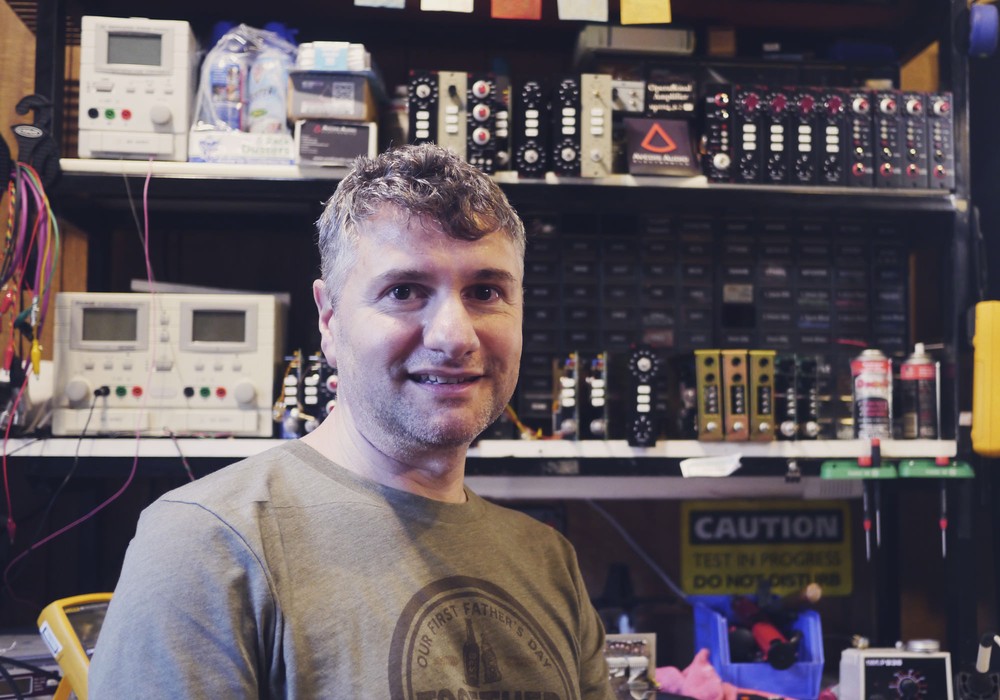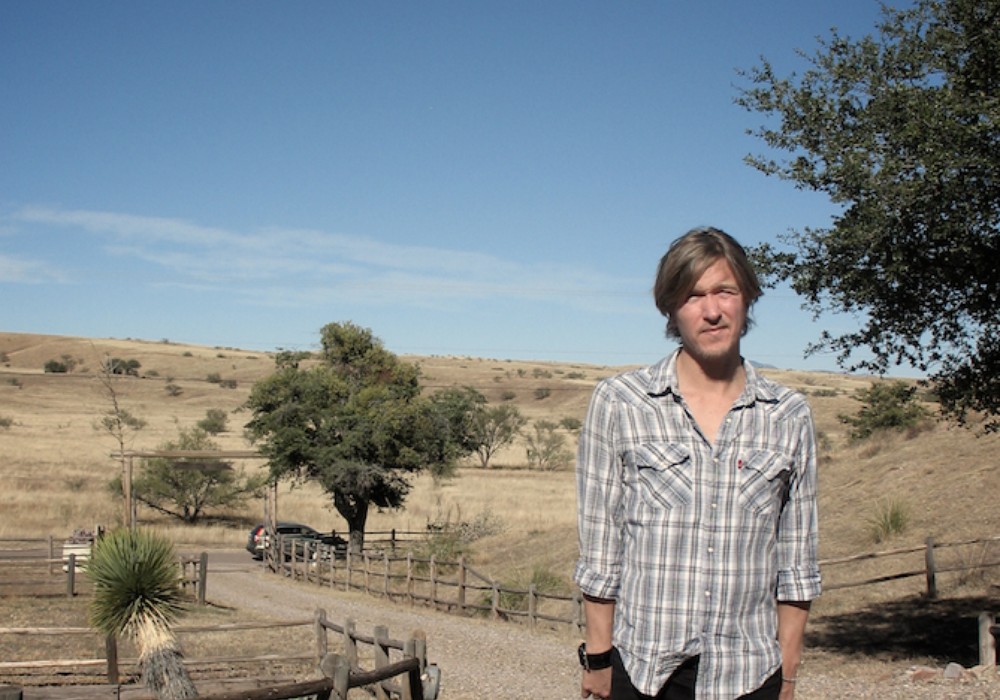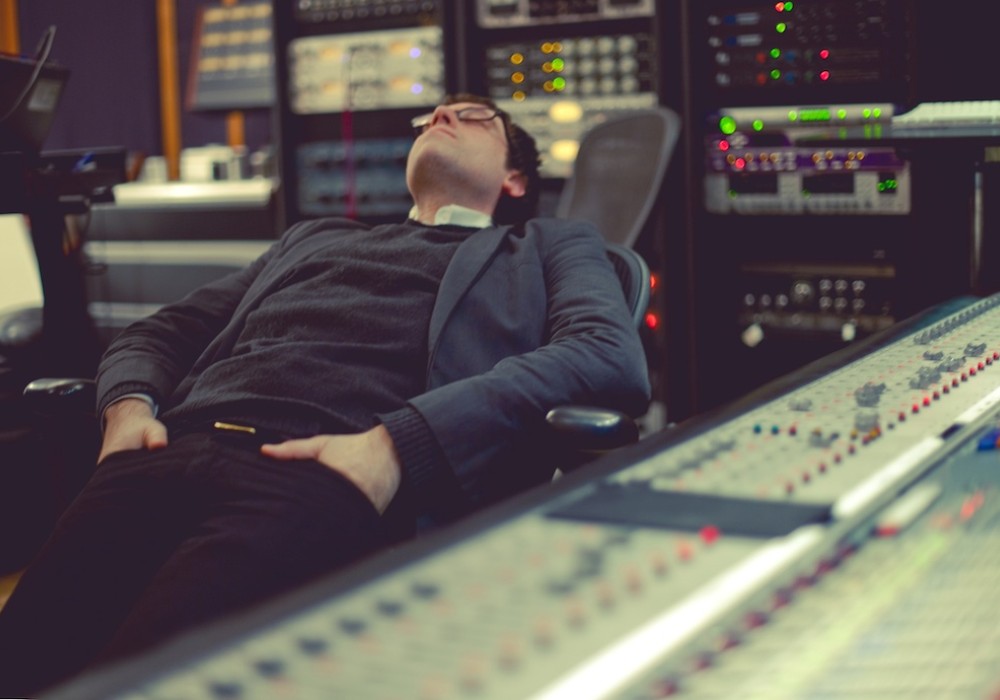With the music biz shifting, daily talk amongst musicians mainly revolves around the subject of adaptability. As old doors close, others are opening, offering creative control, DIY tools, and diversification options. Bands rarely find themselves coddled anymore and have to make things happen for themselves, for better or worse.
Nobody exemplifies the embracing of this lifestyle better than Oliver Ackermann. First making a name for himself with the band Skywave, he soon after founded Death By Audio, a homegrown effects pedal company that was on the leading edge of the boutique effects boom. Whereas his contemporaries seemed to be on an endless search for the ultimate Tube Screamer clone, Ackermann cut new sonic paths, unapologetically stating that his stompboxes weren't for everyone, catering instead to players wanting to summon more excruciating tones out of their guitars. Coming full circle, these sounds find their way into his current band, A Place To Bury Strangers, a three-piece that includes bassist Dion Lunadon and drummer Robi Gonzalez, who have been making post-apocalyptic noise rock for over a decade. Live shows are heady, strobe-fueled and impossibly loud sensory-overloading events, designed to bring on hallucinations. Woe to the band that hits the stage after them.
So it's appropriate that Death By Audio HQ, also a venue and recording studio, looks like an electrical engineer's take on Road Warrior. The walls are lined with enough guitars, in various states of customization, repair, and decrepitude, to shame the members of Sonic Youth. Gear stacks the walls, which are covered in stickers and silkscreen test runs. Yet there is a method to the madness, and everything seems to be in its right place. The shop cranks out an impressive number of well-made pedals that have found their way into the hands of artists as diverse as The Edge, Jeff Tweedy, Trent Reznor, and Kevin Shields [Tape Op #26]. You might think that all of this fascination with decay Ackermann might be a tough interview, but he remains one of the most positive and optimistic people you'll ever meet. It makes sense. Things seem to be going his way.
You're originally from Fredericksburg, Virginia?
Yeah. Growing up there was nice, I guess. It's one of those towns where, as you grow older, it becomes really small. There's almost nothing to do. We would just go hang out at graveyards, abandoned battlefields, or down by the river. I listened to my parents' music, like Bob Dylan and The Beatles, and typical stuff, like Madonna or Billy Joel. I wasn't really into music, but when my brother got his driver's license he drove me around playing the Circle Jerks as loud as it could possibly go. I was like, "What is this crazy stuff?" I started stealing his records: Dead Kennedys, The Misfits, Minor Threat, and The Ramones. That changed everything for me. Then, in high school, my friends and I'm self-taught, through books. This was before a lot of the Internet craze. I did check out a few forums, went to libraries, ordered books, and got tons of hands-on experience by pulling things apart. I failed many times. I would read books and not understand a word of it, but eventually pieces started to fit and make sense. It took maybe a year just to teach myself how to solder. Now I could teach someone how to solder really well in two minutes, but I had no one to guide me.
"Why is this $8 soldering iron not doing a good job?"
Blowtorches! Plumber's solder! I started building effects pedals in 2001. I really wanted to go to Europe with my girlfriend, just backpacking around. We'd already paid for the plane tickets, but we were going to be gone for the month, so I figured that I needed to raise about $3,000. I came out with the first pedal, Total Sonic Annihilation, and put it up on places like Harmony Central as a totally unique effect. I sold enough of them to make $3,000 in a month. That was awesome! I figured that was probably going to be it for effects pedals, that the orders would start trickling off, but then I made this other effects pedal called the Sound Saw. It was way too ambitious, with something like 47 wires running between different circuit boards. I created a giant nightmare for myself. I decided I'd take on any custom job, no matter what it was. I'd build or clone anything. Most of the time I wouldn't have a clue how to build what they wanted me to build, but I'd accept the projects just to be able to learn and figure out how the technology works.
I've taken on recording projects for the same reason — to learn how to do it by doing it.
Sometimes I'd feel so bad, because I'd say, "Yeah, it'll probably take me a month and it'll cost $500." Three months later it's like, "I'm still working on it. Don't worry!" Then I moved to New York. At the time I moved, it was hard making money off of just building effects pedals. I was driving trucks for movies or video shoots, web design, and selling the pedals. I had some bad luck too. I sold a pedal to Richard Fortus, who was in Guns N' Roses, for $150. I drove to his place. There was nowhere to park so I parked at a bus stop. I ran up to his door, gave him the pedal, ran back to my van, and there's a ticket for $150 on my dashboard. I was also selling stuff on eBay, as well as selling off pedals from my personal collection.
How did you end up in New York?
Every time we came up we had so much fun. There was just so much going on — galleries to see. It's the polar opposite of living in a small town, where you ache for that kind of stuff.
So you packed everything up, left your warehouse, and moved to Bushwick [Brooklyn]?
Yeah, we didn't really know what we were doing. We had friends in Williamsburg. Even that was still a little dicey around that time — desolate in some ways — but Bushwick was really rough.
Did you find another warehouse space?
We did, but it wasn't the same. I figured that we could go nuts since we were living in the middle of fucking nowhere in a warehouse. The neighbors were musicians and artists too, but they wanted us to be quiet. We built an almost soundproof room, but still could only really play during the day. I think I had enough money for rent, and $3,000 extra that I'd saved up. I spent that in a week.
On just getting set up?
Partying, going out, and getting crazy, because you're like, "Fuck, yeah! Record stores everywhere. This is so great!" But you adjust. We didn't have all the wood and materials we wanted, so we'd get it any way we possibly could, going to carpet stores and asking for scraps.
People get pretty industrious in the city and do what they have to do, for sure.
We had an open-ended lease. When I finally found this place, in 2005, I asked my friends, who were about to sign another lease, to check out this space instead. We moved in, but it was a giant, empty warehouse. Build- out took two full months of work. That puts a strain on your friends. You start to worry that you got them into something stupid. We had shows to raise money for supplies. The band would get some and we'd keep some. It worked out great.
DBA [Death By Audio] was immediately up and running?
Yes, but we had a strict no advertising policy, so the business would fluctuate. New York is so damn expensive. You start taking out credit cards, because racking up debt is the only way to live. I was trying to help people out by employing them, but that would sometimes mean that I'd be giving away more money than I was making. The company has definitely gotten better and bigger in the past few years, with Matt [Conboy] keeping things organized. Our clients have been great about word of mouth. I've had people tell me the craziest things, like Lou Reed referred them. We're underground enough that we can build products that are illegal in some ways — it could blow something up, or accept radio frequencies. Products that are against codes for what can be manufactured and shipped overseas. We're boutique so that we can build gear to do the most fucked up shit.
It's still considered "custom work?"
Yeah, or we're just under the radar enough.
When did you feel like you crossed over into becoming the company you are now, with an organized setup, able to deliver orders on time?
Matt became an intern in 2007, and really helped out. We made the business an LLC in 2009. We were making the Harmonic Transformer and the Interstellar Overdriver Deluxe, though it might have been the Supreme at the time. Some amp company made us change the name, they claimed to have some patent. We figured it would be easier to not fight it. We were still making the Total Sonic Annihilation, the Soundwave Breakdown, and the Supersonic Fuzz Gun. You see that space [points to the next room]? It used to be much smaller. The floor is damaged from where all the work was done. There was a spray paint booth in there and all sorts of horrible stuff. I used to smoke cigarettes like crazy. Matt never smoked, but he'd have to be in there while I was chain smoking, spraying paint, and building all this electronic stuff.
How do you do that in a city like this? What prevents people from walking in the door and asking for permits?
Right when we moved in here, we got threatened by the fire marshal. He's like, "You need to buy this fire extinguisher from us." So we bought that $350 fire extinguisher. We also lucked out because our landlords are old school in the neighborhood and are really cool. They're Hasidic Jews, and we're right in Williamsburg, which is traditional for this area. They could probably get higher rent, but they like us, and reliability goes a long way. We don't ask them for anything. We'll do our own plumbing and repairs. They like that we don't give them any crap and I think they even appreciate what we do. Right after we built the recording studio, one of the landlord's friends, a Hasidic opera singer, came in and recorded a song.
When did you decide you should add a venue and studio?
I was always a musician, first and foremost. I started out building effects and equipment for me to use. I never thought I'd build effects for other people. It didn't even cross my mind. I started playing in bands in Fredericksburg in 1994, but there was no scene. It was a little bit easier in Providence, but all the people I played with wanted a fun band; playing unrehearsed, crazy stuff. By the time I moved to New York I had almost completely given up. I'd tried so hard. We'd make elaborate posters and mail out really awesome things for people, but it never went anywhere. When the first A Place to Bury Strangers record came out in 2007, it just blew up. We were so lucky to have that happen. If a band's going to make it in this day and age, it's just pure luck, really. Of course there's talent and dedication, but I know tons of obscure awesome bands, and I know tons of huge mediocre bands. It's not just about how good your band is. That helped the pedal company develop a name too, and then it all came together. It makes perfect sense to me to combine all of these things.
You're your own billboard, in a lot of ways. Once you get people's attention, I'm sure they're like, "If I get that pedal, I can do that too!" Of course, that's totally not true.
Yeah, it's not. I feel bad about that sometimes.
But that's the entire guitar gear industry.
Sure, but I feel like an important part of effects pedal design is to make something that's really cool to interface with. You're excited about the way it looks, or what's going on. Like when you and I were talking about nice preamps earlier, which are supposed to sound so awesome. Part of what sounds so awesome is you spent a lot of money on it; it looks really nice, and it's well built. Feel goes a long way. It might not even sound as good as some other thing that's only $200. But there's something about it, and you want to go to that.
So you got to the point where the band took off. You had a space for practice, recording, and building. Were you doing all of your design and pedal case silk screening in-house, at the time?
Yeah. I taught myself silk screening to make band t-shirts. Anyone can make a real silkscreen table. You just buy one of those work lights from Home Depot and use some photo emulsion. You can toss anything that you want down on the screen. It's really cheap to do all of that stuff.
The end result is that your pedals have their own look. They're pretty durable. How do you keep them from getting so scratched up?
We clear coat them. We tried plastisol ink for a little bit, but there's just not enough ventilation in New York to make that really work out.
You're using Hammerite paint for cases?
Yeah. We've been getting a lot of work outsourced now for the powder coating and getting parts drilled. When you're drilling out tons of enclosures all the time, the dust starts to add up really quickly, and aluminum dust is not good for you.
Do you ever run into problems with space issues and people not cleaning up their mess?
It happens, but you just try to always go above and beyond. I always tell everybody to wash a few extra dishes. We always have bands spending the night, so there's lots of cleanup. We built a second bathroom. Sometimes people in the house will get really pissed off if somebody else eats their food or something, but you have to look at all these people as your really good friends and stay above it all. It's worth it. A lot of times those people get weeded out anyways, if they're bad roommates, or they can't handle living this way. We've also had some really crazy roommates. We'd just done a video for "Keep Slipping Away" that featured a bunch of television sets. There was a wall of TVs upstairs, and these guys were really drunk at 4 a.m., so they took all of the television sets and threw them down from the second floor into this giant pile in the middle of the room, and then they lit them on fire.
What?
I know; it was so insane. Then a girl who was subletting comes out of her room, wondering what was going on, and she sees this horrific mess. These dudes are standing around smoldering TV sets, with their shirts off, totally wasted, and she was like, "Oh, my god. What am I doing living here?" Now we really want everyone here to be artists, working on cool projects.
We're all growing up! So when did you set up the recording space?
The practice space was the first room we built, and we immediately set it up for recording. I've been doing it for years because that was the only way I could afford it. When I was young, I started out with the dual-well cassette decks, bouncing back and forth. Eventually we all saved up for a 4-track, then a 6-track, then reel-to- reel machines, better reel-to-reel machines, and then it was, "Oh, my goodness. Computer recording is absolutely amazing!" Now we have none of the problems we did with the reel-to-reels.
You can spend more time recording, rather than maintaining.
Yeah, totally. But as time goes on you start to spend more time tinkering again, because now there are all of the plug-ins! You can spend years mixing. But as soon as we possibly could, this needed to be a recording studio. It's much more of one now than it was before.
What did you start out with?
I had a Tascam USB board. We'd plug into that, as well as some basic Alesis rack units. No outboard preamps. We picked up gear as we went.
What was the first project you did in here?
A really cool New York band called Narchitect. We recorded it in the kitchen area, live. Next were my friends, Coin Under Tongue, who were absolutely amazing. I'd sometimes fill in on the drums for that band. Some guys from Dirty on Purpose, who helped start this space, worked in here. We were all building it for ourselves, and it was in the best interest of everyone. There were lots of bands that no one has probably even heard of.
Have you ever worked in a "proper studio," or have you always done it yourself?
We had a song mixed by Paul Kolderie [Tape Op #22] in Boston. We didn't totally like his mix, so on the record my mix is on the left and his is on the right. We recorded it ourselves in Bushwick and I sent it to Paul. We went up there to hang out with him, and had a great time. It was an amazing experience, but I didn't know what any of that gear was, at the time. [laughs] On Exploding Head, I worked with Andy Smith, who is Paul Simon's personal engineer. He was just a cool guy, really fun to work with. We did some great remixes of the songs. I once recorded a song with a buddy in California at AVID's studio. We recently did some recording in Norway, with Emil Nikolaisen [producer for Arabrot, I Was A King] from Serena-Maneesh, at ABC Studio [Etne, Norway], for free. The people in town were taking us around to places and showing us everything. It was just beautiful. The mountains were out the front door. It didn't work out entirely as planned, because I can't always get other people to understand what I'm going for with the music. It's not even that our records sound that good, in the traditional sense. It's a weird, jaded take on music, and it's almost something you have to endure. It's the aesthetic I like, though. I used to do DJ sets where I'd run music through effects. I'd push the limit of what you'd consider "good sound," but I really liked the way it sounded.
Is this your home base for recording now?
We just finished the record about a month ago. We tried to do it as live as possible, even though some of the songs sound very demo-y, in a sense, and are intermittently tracked. We really wanted to try to capture what it is to be at a live show. To be able to capture that, you can't just record purely; you have to fuck it up, in a way, because being there is disorienting. If you record a live take in the studio really well, it doesn't actually portray the live experience, so being free to experiment is important.
Your tracking room is small. Do you ever run into isolation issues?
It depends. Some songs sound so good with no isolation. Some sound good with just two microphones! One of the new songs is us writing it, right at that moment, with no idea what's going to happen. Even the lyrics. There were supposed to be seven mics, but two weren't plugged in, and the bass DI wasn't plugged in. We were just in there having fun, and it sounds so good. We tried recording it ten more times, but there's no way that we can capture how awesome that first take is. That's made me believe that the equipment is often times beside the point. It's more about the energy, feeling, and what's going on with the players. Recording this stuff doesn't have to be that perfect. It's nice when it is. It's cool when you can lock in certain phase loops with drums and bass to get it pulsating in the right ways. But music is about energy, and getting crazy and wild.
How did you come across some of the recording gear?
I try to build as much as possible. We'd also get recommendations from friends and other people. That's how I got the Universal Audio [2-610] preamp. It sounds phenomenal, and it's so easy to use. I got a good deal on some Chandler [Limited] gear and an [Empirical Labs] Distressor. I bought a couple of 500-series kits and built them. Whatever we could get our hands on, including things someone was just giving away.
How much outboard gear do you use these days?
I used to work a lot in the box, but now I do as little as possible. Outside is just so much more fun. We'll do a lot of manipulation while we're recording; going for it and committing to effects. That can bite you in the ass, but if it sucks we'll figure out a way to do something completely different with it. I've worked on tracks where I'm trying to be so careful, doing everything by the book, but it just becomes so uninspiring. There have been many times where I think I've messed up, but I find something really cool is going on. Crazy sounds that bring the track home.
If people want to come here to make a record, is that something they can do? Can they contact you? Or do you tend to keep it in-house?
Sometimes we'll invite friends, but there are always a lot of people who want to use the space, so we pretty much keep it in the family. It would be cool to do other projects, but I'm just so busy all the time.
You mentioned that you've experimented with different resolutions.
We often watch TV while we're working in the pedal room, and we saw something with Neil Young and all these different artists talking about 192 kHz [sampling rate] and how it sounds absolutely amazing. I was like, "Heck, why not?" We recorded most of the songs for the recent record at 192 as a test. Then, when I was mastering the record, I was going back and forth to see if it was even worth it to bounce down at 44.1 versus 192 kHz. You could tell a difference, but I don't know if the difference made it better. You could almost argue that the sessions at 44.1 sometimes sounded better. I guess that might be due to the different ways the sounds are blended together; or it could just be some computer algorithm. It didn't seem like all of a sudden I heard this greater sound quality or anything. I feel like I've heard so many good songs that were MP3s, and gotten into bands after hearing a crummy CD or poorly-dubbed cassette. They can usually sound just as good, or better, than ones recorded at higher fidelity, because it's just not about that.
You're using Apogee conversion?
The [Apogee] Symphony, and it sounds fantastic. Back when I could only record at 44.1, using Cubase, I bought this Steinberg interface and it never worked. So I'd just blown all my money on this dumb interface that Steinberg made. It was still under warranty, but I was always on the phone with tech support. I had to run out and buy the cheapest setup I could get. It was this Alesis 2-channel USB unit and a lemon of a Power Mac. The fan sounded like a jet engine. Almost the entire first A Place to Bury Strangers [self-titled] record was recorded with that. I only had two channels for the drums! That was a highly- acclaimed record for us, but, at the time, I didn't even want it to come out! When I first moved to New York I was under this impression that if you wanted to make it, you had to go to a real studio and do it proper. My bands had been making records that we thought sounded so awesome, but then nothing would ever happen with them. I started thinking the missing element was that we needed to go to a pro studio, and that would be what made us sound like a real band. People would recognize something that was missing in the recordings we were doing ourselves. We planned to do it professionally one day, but John Whitney wanted to put out the record, as it was, on his label, Killer Pimp. He wrote out this contract on a napkin, it was released, and it just blew up. It justified everything that I had been doing over the years. It made me completely confident; I can do whatever the fuck I want and not have to worry about playing some game. I had full creative control, and people liked what I did with it. I was so lucky to have that kind of justification, really.
Not a lot of people get that.
No. It also made me think sometimes, when people use producers, that it's not the band making the record. "Oh, we'll just get Kareem Abdul-Jabbar on our little basketball team. This guy's the best basketball player of all time." There's almost something unfair about it.
That's an interesting way of putting it!
We've developed our own skills, and figured out our own way to record. Sometimes we record almost entirely on gear that we created. Sometimes we even made the microphones. It's something that we actually had a hand in every aspect of, and worked hard to make happen. It's expressing ourselves as artists. I think there's something really cool about the way that music has turned. You can do it yourself; people are doing it themselves, and doing a really good job. There's nothing wrong with working with producers, and there are definitely people who are talented at it. That's a beautiful thing.
They can coexist. You can have both.
I always like to have everything we do be as real and fair as possible. We do the same thing with the business, Death by Audio. We try to be a company like no other. We'll take exchanges on some beat up piece of crap, or we'll try to mod people's pedals to be exactly what they wanted, if they wanted something different than what they got. We'll always repair everything for free.
You have the lifetime warranty.
Yeah, totally. We try to be as cool of a company as we can.
Do you get back a lot of products that you have to fix?
Well, the highest percentage of repairs are actually where there's nothing wrong with the pedal. We get a lot of repairs where it's a dead battery, or someone was maybe using bad cables. People have sent pedals back because one of the knobs fell off. They didn't understand that you can put it back on with a screwdriver. Matt has been asking people to send in sound samples before they mail in a warranty repair. He can usually figure out that it's actually working and help. A couple of the pedals have some really insane settings. You know, it's called the Oscillator Fuzz, but someone contacts us saying, "I dunno, man. This setting oscillates." They're saying that the Oscillator Fuzz oscillates. [laughs] What do you write back to that? Some of the pedals aren't for everybody. Our first pedal, Total Sonic Annihilation, was a forced feedback loop. It's a really intense noise-maker, so a lot of people were really confused by it. "Whoa, this is not for me." It takes a particular kind of person to enjoy what that one does.
